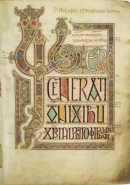| Genesis | Exodus | Leviticus | Numbers | Deuteronomy | Joshua | Judges | Ruth |
| 1 Samuel | 2 Samuel | 1 Kings | 2 Kings | 1 Chronicles | 2 Chronicles | Ezra |
| Nehemiah | Esther | Job | Psalms | Proverbs | Ecclesiastes | Song of Solomon |
| Isaiah | Jeremiah | Lamentations | Ezekiel | Daniel | Hosea | Joel | Amos | Obadiah |
| Jonah | Micah | Nahum | Habakkuk | Zephaniah | Haggai | Zechariah | Malachi |
| Tobit | Judith | Additions to Esther | Wisdom of Solomon | Ecclesiasticus | Baruch |
| Letter of Jeremiah | Prayer of Azariah | Susanna | Bel & the Dragon | 1 Maccabees |
| 2 Maccabees | 1 Esdras | 2 Esdras |
| Matthew | Mark | Luke | John | Acts | Romans | 1 Corinthians | 2 Corinthians |
| Galatians | Ephesians | Philippians | Colossians | 1 Thessalonians | 2 Thessalonians |
| 1 Timothy | 2 Timothy | Titus | Philemon | Hebrews | James | 1 Peter | 2 Peter |
| 1 John | 2 John | 3 John | Jude | Revelation |
 The Book:
The Book:
1 Maccabees is a deuterocanonical book of the Bible which was written by a Jewish (pre-Christian) author, probably about 100 BC, after the restoration of an independent Jewish kingdom. It is accepted in the Catholic and Orthodox canons. Protestants and Jews regard it as generally reliable history, but not a part of Scripture. Some Protestants consequently regard 1 Maccabees as part of the Apocrypha, useful for reading in the church.
 Contents:
Contents:
The setting of the book is about a century after the conquest of Judea by the Greeks under Alexander the Great, after Alexander's empire has been divided so that Judea was part of the Greek Seleucid Empire. The book tells how the Greek ruler Antiochus IV Epiphanes attempted to suppress the practice of basic Jewish religious law, resulting in a Jewish revolt against Seleucid rule. The book covers the whole of the revolt, from 175 to 134 BC and highlights how the salvation of the Jewish people in this crisis came from God through Mattathias' family, particularly his sons Judas, Jonathan and Simon, and his grandson John Hyrcanus. The doctrine expressed in the book reflects traditional Jewish teaching, without later doctrines found in, for example, 2 Maccabees.
In the first chapter, Alexander the Great conquers the territory of Judea, only to be eventually succeeded by the Seleucid Antiochus Epiphanes. After successfully invading the Ptolemaic kingdom of Egypt (apparently without Jewish support), Antiochus IV captures Jerusalem and removes the sacred objects from the Jerusalem temple, slaughtering many Jews. He then imposes a tax and establishes a fortress in Jerusalem.
Antiochus then tries to suppress public observance of Jewish laws, apparently in an attempt to secure control over the Jews. He desecrates the Temple by setting up a "horrible abomination" (an idol). Antiochus forbids both circumcision and possession of Jewish scriptures on pain of death. He also forbids observance of the sabbath and the offering of sacrifices at the Jerusalem temple. He even requires Jewish leaders to sacrifice to idols. While enforcement may be targeting only Jewish leaders, some Jews (and even children) are killed as a warning to others. Antiochus also introduces practices of Hellenistic culture, such as gymnasiums into Jerusalem. This discouraged the forbidden Jewish practice of circumcision, since it would not be hidden in the gymnasium.
Mattathias calls the people forth to holy war against the invaders, and his three sons begin a military campaign against them. There is one complete loss of a thousand Jews (men, women and children) to Antiochus when the Jewish defenders refuse to fight on the Sabbath. The other Jews then reason that they must fight even on the sabbath when attacked. In 165 BC the Temple is freed and reconsecrated, so that ritual sacrifices may begin again. The festival of Hanukkah is instituted by Judas Maccabee and his brothers to celebrate this event. (1 Macc. iv. 59). Judas seeks an alliance with the Roman Republic to remove the Greeks. He is "succeeded" by his brother Jonathan, who becomes high priest and also seeks alliance with Rome and Sparta. Simon follows them, receiving the double office of high priest and prince of Israel. (Simon and his successors form the Hasmonean dynasty, which is not always considered a valid kingship by the Jews, since they were not of the lineage of David.) Simon leads the people in peace and prosperity, until he is murdered by agents of Ptolemy, who had been named governor of the region by the Greeks. He is succeeded by his son, John Hyrcanus.
The name Maccabee probably means "hammer" and is properly applied only to the first leader of the revolt, Judas, third son of the priest Mattathias. The name Maccabee also might derived from the battle cry of the revolt, Me Kumocha B'elim, (Hashem) ("Who is like you among the heavenly powers, HASHEM!" - Exodus ch. 15:11). In Hebrew, the first letters of this four word slogan form the acronym MKBY (Mem, Kaf, Bet and Yud). This became synonymous with the revolt. Its most famous warrior was Judah the Maccabee. The name came to be used for his brothers as well, which accounts for the title of the book. Scholars infer that in the original Hebrew, the term used for "horrible abomination" would have sounded similar to "Lord of heaven", so that this term might refer to an image or altar of Zeus.
Source: Wikipedia, the free encyclopedia © 2001-2006 Wikipedia contributors
(Disclaimer)
This article is licensed under the GNU Free Documentation Licence.
View this article at Wikipedia.org
 Print this page
Print this page